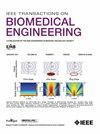Frequency Domain Channel-Wise Attack to CNN Classifiers in Motor Imagery Brain-Computer Interfaces
IF 4.5
2区 医学
Q2 ENGINEERING, BIOMEDICAL
引用次数: 0
Abstract
Objective: Convolutional neural network (CNN), a classical structure in deep learning, has been commonly deployed in the motor imagery brain-computer interface (MIBCI). Many methods have been proposed to evaluate the vulnerability of such CNN models, primarily by attacking them using direct temporal perturbations. In this work, we propose a novel attacking approach based on perturbations in the frequency domain instead. Methods: For a given natural MI trial in the frequency domain, the proposed approach, called frequency domain channel-wise attack (FDCA), generates perturbations at each channel one after another to fool the CNN classifiers. The advances of this strategy are two-fold. First, instead of focusing on the temporal domain, perturbations are generated in the frequency domain where discriminative patterns can be extracted for motor imagery (MI) classification tasks. Second, the perturbing optimization is performed based on differential evolution algorithm in a black-box scenario where detailed model knowledge is not required. Results: Experimental results demonstrate the effectiveness of the proposed FDCA which achieves a significantly higher success rate than the baselines and existing methods in attacking three major CNN classifiers on four public MI benchmarks. Conclusion: Perturbations generated in the frequency domain yield highly competitive results in attacking MIBCI deployed by CNN models even in a black-box setting, where the model information is well-protected. Significance: To our best knowledge, existing MIBCI attack approaches are all gradient-based methods and require details about the victim model, e.g., the parameters and objective function. We provide a more flexible strategy that does not require model details but still produces an effective attack outcome.运动图像脑机接口中 CNN 分类器的频域信道攻击
目的:卷积神经网络(CNN)是深度学习的一种经典结构,已被广泛应用于运动图像脑机接口(MIBCI)。人们提出了许多方法来评估这种 CNN 模型的脆弱性,主要是通过直接使用时间扰动来攻击它们。在这项工作中,我们提出了一种基于频域扰动的新型攻击方法:对于频域中给定的自然 MI 试验,所提出的方法称为频域信道攻击(FDCA),可在每个信道上产生一个接一个的扰动,以欺骗 CNN 分类器。这种策略有两方面的优势。首先,扰动不是集中在时域,而是在频域中产生,在频域中可以为运动图像(MI)分类任务提取辨别模式。其次,扰动优化是基于差分进化算法在黑盒场景中进行的,不需要详细的模型知识:实验结果证明了所提出的 FDCA 的有效性,它在四个公开 MI 基准上攻击三个主要 CNN 分类器的成功率明显高于基线和现有方法:在频域产生的扰动在攻击由 CNN 模型部署的 MIBCI 时产生了极具竞争力的结果,即使在模型信息保护良好的黑盒环境中也是如此:据我们所知,现有的 MIBCI 攻击方法都是基于梯度的方法,需要受害者模型的详细信息,如参数和目标函数。我们提供了一种更灵活的策略,它不需要模型细节,但仍能产生有效的攻击结果。
本文章由计算机程序翻译,如有差异,请以英文原文为准。
求助全文
约1分钟内获得全文
求助全文
来源期刊

IEEE Transactions on Biomedical Engineering
工程技术-工程:生物医学
CiteScore
9.40
自引率
4.30%
发文量
880
审稿时长
2.5 months
期刊介绍:
IEEE Transactions on Biomedical Engineering contains basic and applied papers dealing with biomedical engineering. Papers range from engineering development in methods and techniques with biomedical applications to experimental and clinical investigations with engineering contributions.
 求助内容:
求助内容: 应助结果提醒方式:
应助结果提醒方式:


